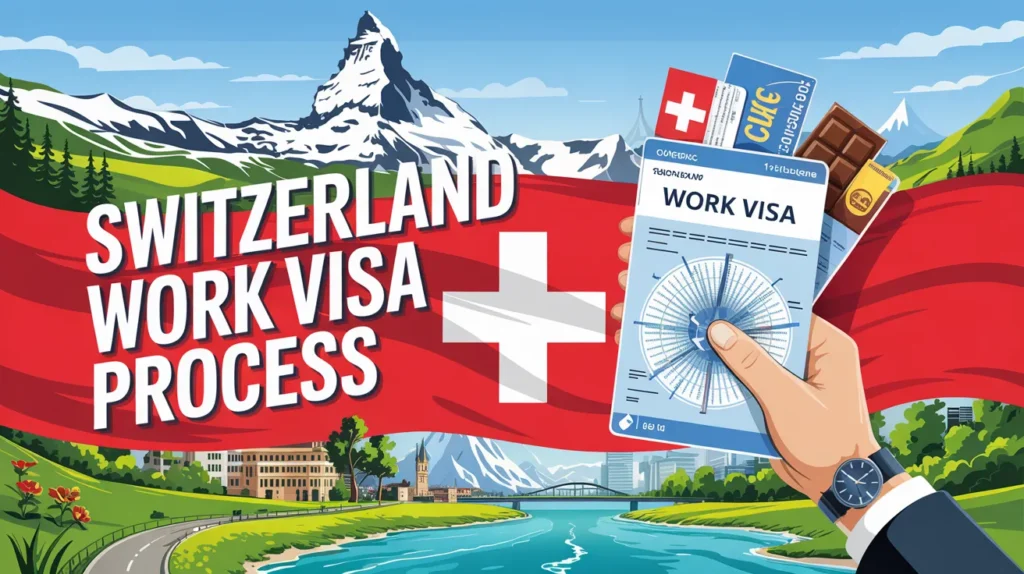
With everything from brief- and long-term home licenses, extraordinary work licenses, and self-employment visas accessible, it can be challenging to decide which visa representatives ought to work in Switzerland.
The Swiss work visa is one of the sorts of the Switzerland long-stay visa (moreover known as a national or D-visa). It permits the holder to work in Switzerland for the length that the visa is issued. The method of applying for a Swiss work visa depends on your nationality, among other things. As with other sorts of visas, diverse rules apply for EU/EFTA citizens as opposed to non-EU/EFTA citizens.
Types of work visas in Switzerland
Before diving into the distinctive sorts of work grants, companies ought to know that the prerequisites contrast based on nationality. Citizens from the European Union (EU) and European Free Exchange Affiliation (EFTA) nations confront fewer obstacles and don’t have universal specialist shares (but Croatian nationals).
Switzerland is a portion of the Schengen range; in this manner, a Swiss Visa empowers free travel to other parts of the nation. In case you’re enlisting EU/EFTA nationals, they can apply for 1 of the following options:
- Permit L: This allows short-term inhabitants who need to live in Switzerland for less than a year. Candidates will require a business contract substantial for 3 to 12 months, and the visa will coordinate that length.
- Permit B: Expats who need to live in Switzerland for longer than a year can apply for a B if they have a work contract enduring at the slightest 12 months.
- Permit G: Cross-border commuters who work in Switzerland but live in a border zone are qualified for a G allow. They must return to their primary school at least once a week.
Who is Eligible
As a non-EU/EFTA citizen, you’re qualified to apply for a Switzerland work visa on the off chance that you meet the following conditions:
- You are a talented and qualified laborer (director, master) and you’ve got a college degree, a long time of work involvement, and particular expertise.
- You as of now have work holding up for you.
- No EU/EFTA citizen seems to take the job instead.
- The yearly standards for Swiss work visas permit it.
If you meet those prerequisites, and your boss is applying for your home allowance, at that point you’ll be able to apply for your Switzerland work visa.
Requirements
When it comes to non-EU/EFTA nationals as well as Croatian nationals, the government in Switzerland has put shares in put that constrain the number of grants disbursed each year. Once the quantity is come to, expats ought to hold up another year to apply for the allow. Since Switzerland comprises 26 cantons or part states, requirements also shift among locations.
Non-EU/EFTA citizens confront numerous necessities. For example, non-Swiss nationals ought to be familiar with and proficient at a certain level in their canton’s overwhelming language.
Other capabilities and prerequisites include:
- Holding a gifted position
- Possessing a college or comparative degree from the next instruction institution
- Having a long time of proficient work experience
- Completing the application form
- Providing 2 visa photos
- Presenting the first visa and duplicates of past visas
- Ensuring 2 clear visa pages
Employers too ought to fulfill certain prerequisites. To begin with, companies must demonstrate that it wasn’t conceivable to discover a qualified nearby representative from Switzerland to fill the position. Companies will too have to clarify the requirements for the work opening and verification that it was promoted to citizens of Switzerland.
How to Apply?
- First, your boss applies for your home allowance at the neighborhood cantonal business administrations in Switzerland. There are no separate work licenses and home grants in Switzerland. Instep, you will be issued a home allowance which authorizes you to work.
- Your manager can demonstrate to the cantonal specialists that there were no EU/EFTA citizens appropriate for the work instead.
- The nearby cantonal specialists survey your application and allude it to the Government Office for Relocation (FOM) for approval. When they make their choice, the FOM takes into consideration your dialect aptitudes, your age, and how well you’ll be able to adjust to Swiss culture.
- While your manager applies for your Swiss home allowance, you’ve got to apply for a Swiss work visa (moreover known as a long-stay or a national visa) from your domestic nation. Most non-EU/EFTA nationals require a long-stay (national) visa to enter Switzerland. See here whether you wish one. You’ll be able to apply for the Switzerland work visa at your country’s Swiss embassy/consulate.
- When the FOM makes their choice of your home, they inform you, your manager, and the cantonal workplaces. If the FOM endorses your home, the cantonal workplaces advise the Swiss embassy/consulate.
- The Swiss embassy/consulate in your nation gives you your Swiss work visa.
- You enter Switzerland and you have 14 days to enroll at the Residents Registry Office through the neighborhood cantonal migration offices.
- You get your Swiss home allowance and are permitted to live and work in Switzerland.
Other Vital Factors
EU and EFTA nationals holding a Swiss home allow or short-stay allow may bring:
- Their life partner as well as their possess children or their spouse’s children (who are under the age of 21 or get support).
- Their parents or their spouse’s guardians get bolster (this choice isn’t accessible for students).
- This arrangement applies in any case of the nationality of the family members.
Sum Up
Since Switzerland has built up free development with the EU and EFTA, citizens from those countries can openly enter Switzerland and remain there for up to three months, without any visa. In any case, when it comes to remaining longer than three months and working in Switzerland, they must apply for a satisfactory allowance. To be specific, a home allows you to take up work.
